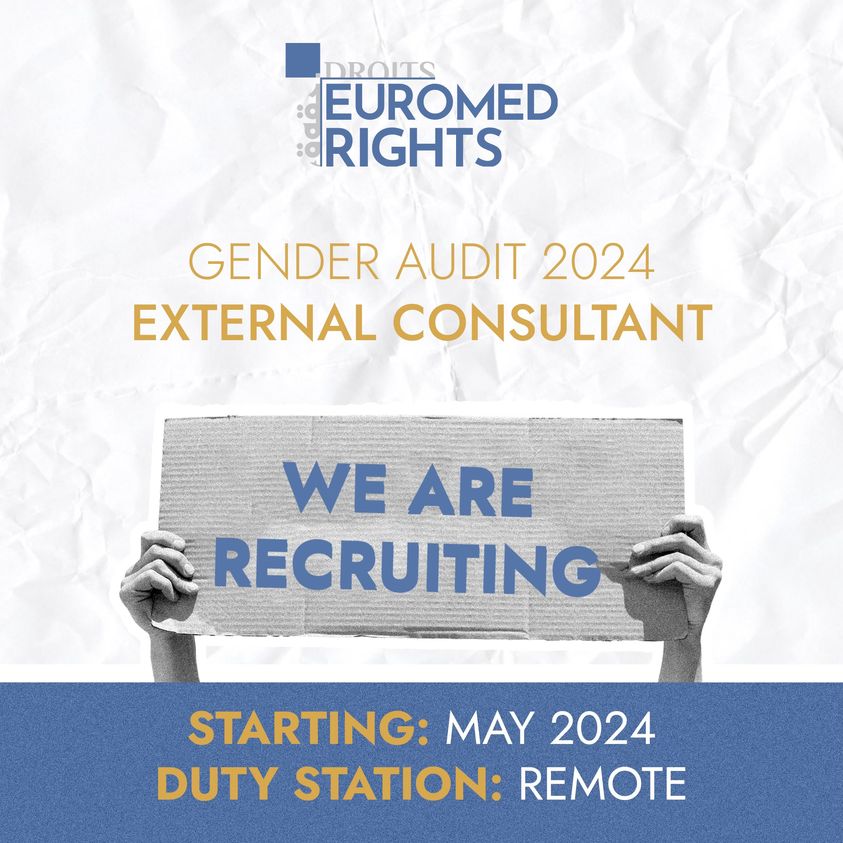Gender audit 2024 – External Consultant, Euromed Rights

EuroMed Rights is a non-governmental organization aiming to promote cooperation and dialogue in and between countries on both sides of the Mediterranean Sea. It is a network representing 68 human rights organizations, institutions and defenders in 30 countries. It was founded in 1997, following the 1995 Barcelona Declaration, by civil society organizations dedicated to promoting human rights and democracy within the framework of the Euro-Mediterranean Partnership.
EuroMed Rights’ mission is to promote and strengthen human rights and democratic reforms at regional and national levels. By creating network opportunities and encouraging civil society cooperation, EuroMed Rights aims to develop and strengthen the partnerships between NGOs located within the Euro-Mediterranean area, to spread and promote human rights values and to increase members’ capacities to reach these objectives.
As a human rights organisation, EuroMed Rights is committed to working towards achieving gender equality on the ground and to lead by example with member organisations and human rights practitioners. EuroMed Rights is also committed to ensuring that its own activities are not gender blind, which could eventually reinforce a status-quo situation for women and men in Euro-Mediterranean countries, if not worsen the situation. Therefore, to promote gender equality both internally in its organisational policies and structures, and externally in its work on the promotion of human rights, EuroMed Rights has adopted a dual strategy consisting of gender mainstreaming, and targeted actions on women’s rights and gender justice.
Since 2004, EuroMed Rights has worked proactively on promoting gender equality in the Euro-Mediterranean region. The commitment of EuroMed Rights to the promotion of gender equality, the principles of gender parity and equal opportunities in its decision-making structures is inscribed in the network’s statutes and bylaws. In 2011, EuroMed Rights further adopted a Gender Equality Policy Paper (GEPP) outlining its commitments and objectives regarding gender equality. This policy was subsequently adopted by the Executive Committee and formalised during the EuroMed Rights General Assembly in 2012.
EuroMed Rights is developing regularly Gender Mainstreaming audits ahead of the General Assembly held every three years and develops a Gender Mainstreaming Roadmap and action plan based on its findings. The last GM audit took place in 2021. The current GM Roadmap 2022-2024 and its related action plan incorporates the recommendations of the last audit as a driver to achieve EuroMed Rights ambition to mainstream gender at all levels (political, organisational and programmatic).
Ahead to the EuroMed Rights general assembly to take place in October 2024, the present audit aims at evaluating the advancements and challenges at the three levels of the gender mainstreaming roadmap.
Objective of the consultancy
The general objective of the gender audit is to evaluate and take stock of the progress made towards implementing the EuroMed Rights Gender Mainstreaming Roadmap 2022-2024 (hereafter called “the GM roadmap”). The specific objectives of the audit are as follows:
- To outline the advancements and achievements at the three strategic levels of the roadmap since its adoption in 2022.
- To identify the challenges met in the implementation of the roadmap and the existing good practices within the organisation.
- To outline the lessons learnt during the implementation of the roadmap.
- To come up with recommendations for the future, based on realistic priorization according to the roadmap and duplication/scaling of existing good practices, and including proposed next steps, that will feed into a revision of the next GM roadmap.
Other Opportunities































 Syria
Syria 
